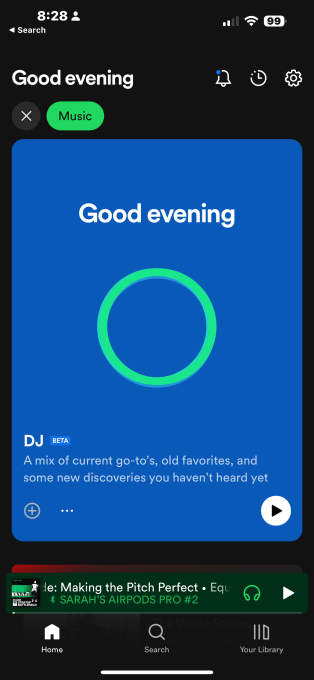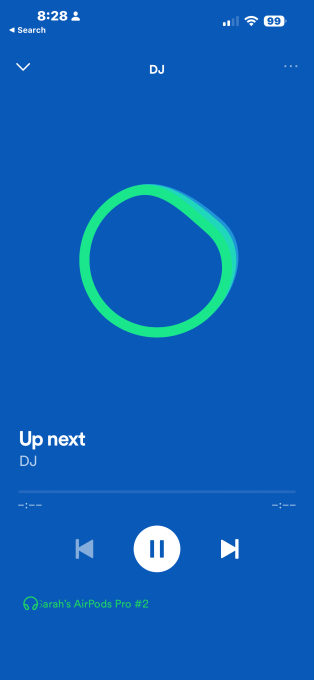Ahead of Spotify’s upcoming Stream On event, where the company is expected to announce a redesigned home feed and other updates, the company today launched a new AI feature called “DJ” to better personalize the music listening experience for its users. Similar to a radio DJ, Spotify’s DJ feature will deliver a curated selection of music alongside AI-powered spoken commentary about the tracks and artists you like, using what Spotify says is a “stunningly realistic voice.”
The idea, explains the company, is for Spotify to get to know users so well that the DJ can choose what to play for you when you hit the button. Or, as Spotify says, it’s putting an “AI DJ in your pocket.”
More broadly, the feature has the potential to turn Spotify into a lean-back, passive experience for those times users don’t feel like dictating to Spotify what to stream next or fumbling around with its interface to find a playlist they like.
The OpenAI-powered feature is still in beta testing as of the time of today’s launch and is only available in English for Spotify Premium subscribers in the U.S. and Canada for the time being.
For years, Spotify has led the market with its personalization technology, launching its flagship playlist Discover Weekly back in 2015 to immediate success. This was then followed by a number of other playlists designed to cater to the end user’s unique preferences, including Release Radar, Daily Mixes, Your Time Capsule, Blend and those aimed at specific activities, like commuting or working out, among other things. In more recent years, Spotify has also become a trendsetter with its personalized annual review, Spotify Wrapped, which has since been copycatted by its rivals.
With the wider technology market now focused on new ways to leverage AI advances, it was only a matter of time before Spotify rolled out its own take on how modern AI could be used to improve its personalization experience.

In this case, the company says its new DJ feature is a combination of its existing personalization technology, an AI voice from its 2022 Sonantic acquisition, and Generative AI through the use of OpenAI technology. (Spotify tells us it has a business relationship with OpenAI, but did not refer to the company as a partner.)
Instead, Spotify says it provided its music editors, experts, scriptwriters and data curators with access to OpenAI’s Generative AI tech in order to scale their insights about music, artists and genres. The technology is being put to use to create “culturally relevant, accurate pieces of commentary at scale,” the company says. (Accuracy is perhaps a key word here, given Bing and Google’s recent AI failures. Time will tell if Spotify’s use case faces similar struggles.)
As listeners engage with the new DJ feature, they’ll be presented with a personalized stream of songs that will include both newer tracks and old favorites. This stream will be continually refreshed, we understand. As they listen, they’ll also hear commentary directly followed by the song it’s referring to.
For example, the AI may share commentary like:
“This week, Chicago rapper Polo G teams up with Atlanta’s Future for his first release of the year. This also marks the pair’s first collaboration, but they’re united by production from Southside, who has worked extensively with both and is said to be responsible for most of the music on Polo’s upcoming project.”
If the DJ fires a miss in terms of what someone wants to hear, the user will be able to just tap the DJ button again to shift to a different genre, artist or mood. The more the feature is used, the more accurate its suggestions will become — similar to how song skips or liking a track would otherwise inform an algorithm of your interests.

The DJ’s voice, meanwhile, is based on Spotify’s Head of Cultural Partnerships Xavier “X” Jernigan, who had hosted Spotify’s morning show podcast, “The Get Up.” The company notes his voice is the “first model” for the DJ feature — suggesting it has plans to expand the range of voices in the future.
To access the DJ, you’ll head to the Music Feed on the Home page of Spotify’s iOS or Android app then tap Play on the DJ card to begin. The DJ will then begin to play a lineup of music and short commentary.
In brief tests of the feature ahead of the launch, we can confirm the voice did sound authentic even as it inserted the personalized content during its introduction, like references to the names of bands you regularly stream. However, it didn’t immediately seem to be more remarkable than one of Spotify’s personalized playlists in terms of music selection. But, in theory, DJ’s improvements will come in time.
After tapping through a number of initial suggestions, the DJ then switched to play songs you had streamed in a prior year. We had expected these flashbacks would be mixed in with the newer tunes, so this separation was a surprise. We then tapped through the recommendations again, and the DJ switched genres. Again, and it switched to summer flashbacks. It felt like switching between playlists, in a way.
Initially, the DJ appears as a green circle on a blue background, but as you play the music, it’s relocated to the bottom-right of the Now Playing interface, which otherwise looks the same — it plays the looping visuals if available, offers player controls and provides access to the heart button and to the lyrics, as before.
We haven’t had enough time to test the feature make any sort of recommendation on its use or determine how well the DJ improves its suggestions over time.
Spotify’s marketing of the feature as an AI-powered addition is meant to draw consumer interest in its streaming service as AI developments, like ChatGPT and Google’s Bard, are driving awareness of both the promise and the pitfalls of AI advancements.
However, the feature also arrives at a time when there’s been increasing criticism that Spotify’s investments in other audio formats have made its app cluttered and harder to use for streaming music. Those complaints haven’t necessarily hurt the company’s growth, however — the streamer’s shares popped last month on its report of solid user growth in Q4, which saw the addition of 10 million new subscribers, to reach 205 million, and 22 million more ad-supported users, to reach a total of 295 million.
But as Spotify’s early advances in personalization technology are now seemingly table stakes for any music service, it’s clear it wanted to now set the bar even higher by doing something new with AI that’s not as easily reproducible.
The company said the DJ feature will begin to roll out today in its supported markets, which means you may not immediately see the feature but should soon.































Comment